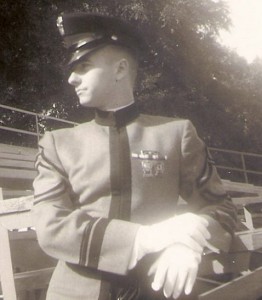It Costs Nothing to be Polite
 When I was thirteen-years-old, my family moved from Oregon to Florida. To that point in my life, I’d lived in Germany, Washington state, and Oregon. There is a HUGE cultural difference between the Pacific Northwest and the Southeastern United States, and it manifested itself in my first southern classroom.
When I was thirteen-years-old, my family moved from Oregon to Florida. To that point in my life, I’d lived in Germany, Washington state, and Oregon. There is a HUGE cultural difference between the Pacific Northwest and the Southeastern United States, and it manifested itself in my first southern classroom.
My teacher asked me a question and I said, “Yeah.” I didn’t say, “Yeah,” with an attitude of disrespect; however, the teacher took the simple word to be disrespectful.
She said, “Yeah?” Emphasizing the word and making it two syllables. At that point, the rest of the class started chuckling, because they recognized my ignorant faux pax.
I replied with, “Yeeaaahhh,” slowing down the word in a long stretch.
She said, “Yes?”
Not knowing what else to do, I said, “Yes?”
She said, “Yes, what?”
I said, “I don’t understand?”
She said, “What don’t you understand?”
I said, “This entire exchange. I don’t understand. Yes, what?”
She finally said, “When you answer me, you say, ‘Yes, ma’am,’ or, ‘No, ma’am.’ Every time. Do you understand?”
I remember starting to say, “Yeah,” but stopped myself and very slowly said the words for the first time in my life, “Yes, ma’am.”

My husband Gregg is southern to the core. His parents hailed from South Carolina. His father graduated from the Citadel. He refers to the Civil War as “The Recent Unpleasantness.” In his parents’ dining room hangs the portrait of a Confederate great-grandfather in his Confederate uniform. He comes from a proud southern family with proud southern roots. He takes children speaking to adults with southern manners very seriously.
Gregg will often roll out, with his honey smooth southern accent, a Winston Churchill quote, “When it comes time to kill a man, it costs nothing to be polite.”
I don’t punish my children for not saying “ma’am” or “sir”. I just correct them. All.day.long. Sometimes I wonder what the point is. Sometimes I think I’m just wasting my breath and they’ll never learn. But then I watch Kaylee and realize they’re getting it – she did, so they’ll get it. To me, it is important that they don’t face a teacher like I did, brand new in a brand new school, state, region of the country, and in front of an entire class be broken down like I was. I want them to know the answer to, “Yes, what?”
For Mothers’ Day weekend, we went to my parents’ house. All day Saturday, I watched the boys interact with my parents. And all day, I heard, “Yes, please.” “No, thank you.” “Yes, ma’am.” “No, sir.” I didn’t have to correct and/or prompt them a single time. Now, when they spoke to me, I had to prompt them. But with my parents, I didn’t. Progress!
Yesterday, I came across this article: 25 Manners Every Child Should Know by Age 9. I thought it was very well thought out — and also thought that a good chunk of our culture today is lacking in these areas. So many children are simply rude. And they’re not rude to be disrespectful, they’re rude by simply not exhibiting these manners. And I can only think that their parents must not be teaching them these simple manners.
- When asking for something, say “Please.”
- When receiving something, say “Thank you.”
- Do not interrupt grown-ups who are speaking with each other unless there is an emergency. They will notice you and respond when they are finished talking.
- If you do need to get somebody’s attention right away, the phrase “excuse me” is the most polite way for you to enter the conversation.
- When you have any doubt about doing something, ask permission first. It can save you from many hours of grief later.
 The world is not interested in what you dislike. Keep negative opinions to yourself, or between you and your friends, and out of earshot of adults.
The world is not interested in what you dislike. Keep negative opinions to yourself, or between you and your friends, and out of earshot of adults.- Do not comment on other people’s physical characteristics unless, of course, it’s to compliment them, which is always welcome.
- When people ask you how you are, tell them and then ask them how they are.
- When you have spent time at your friend’s house, remember to thank his or her parents for having you over and for the good time you had.
- Knock on closed doors — and wait to see if there’s a response — before entering.
- When you make a phone call, introduce yourself first and then ask if you can speak with the person you are calling. (sidenote from the parent of a teenager: read this post I wrote regarding this issue)
- Be appreciative and say “thank you” for any gift you receive. In the age of e-mail, a handwritten thank-you note can have a powerful effect.
- Never use foul language in front of adults. Grown-ups already know all those words, and they find them boring and unpleasant.
- Don’t call people mean names.
- Do not make fun of anyone for any reason. Teasing shows others you are weak, and ganging up on someone else is cruel.
- Even if a play or an assembly is boring, sit through it quietly and pretend that you are interested. The performers and presenters are doing their best.
- If you bump into somebody, immediately say “Excuse me.”
- Cover your mouth when you cough or sneeze, and don’t pick your nose in public.
- As you walk through a door, look to see if you can hold it open for someone else. (Sidenote from the wife of a southern gentleman: Gregg will say to Kaylee, “What is a man’s job?” She’ll answer, “To open the door.” Gregg will say, “What is the woman’s job?” Kaylee will answer, “To let him.”)
- If you come across a parent, a teacher, or a neighbor working on something, ask if you can help. If they say “yes,” do so — you may learn something new.
- When an adult asks you for a favor, do it without grumbling and with a smile.
- When someone helps you, say “thank you.” That person will likely want to help you again. This is especially true with teachers!
- Use eating utensils properly. If you are unsure how to do so, ask your parents to teach you or watch what adults do.
- Keep a napkin on your lap; use it to wipe your mouth when necessary.
- Don’t reach for things at the table; ask to have them passed.
Do you push manners on your children? What do you think of this list?
Hallee
I’m so grateful for your visit, today.
You would bless me if you added me to your ![]() feed reader or subscribed
feed reader or subscribed  via email.
via email.
You can also become a fan on ![]() Facebook or follow me on
Facebook or follow me on ![]() Twitter. I would love to see more of you!
Twitter. I would love to see more of you!


I think this is a great list, and I totally agree that a lot of kids these days are not learning how to be polite. I absolutely hate it when my kids are rude to me, and even though it’s tiring to be constantly reminding them to be polite, I know that it will pay off one day.
Something I would add to the list that my mum actually was talking to me about one day is that when we’re out somewhere and there’s food/snacks served on a table, that my children don’t reach for the cookies or whatever it is themselves, but wait for me to pick something off the plate for them. I especially make them follow this rule if it’s a plate that adults will be eating from as well because I don’t want my children touching everything on the plate that other people might want to eat eventually. Knowing them, they’d touch half the cookies before picking up the one they want! :)
Some adults I know do the same thing – haha.
Great List… My children are 2 and 4, so we are still in the “learning and reminding” phase. However every once in awhile (mostly outside of the house) my son will hold the door open for a lady or will shake a older mans hand and I think maybe we will get there some day.
I printed the list out to hang on the refrigerator.
We continually remind our kids at home, too. However, when he is outside the home (church, pre-school, others’ houses) we often get the report that he was great and well behaved. I’m surprised when other adults are surprised when he says please and thank you. We just expect it, because we have cultivated it.
We too greatly stress manners for our son. He is 3.5 and does quite well for his age, not always (mostly outside of the house as you and others have stated). I suspect the task may become more daunting with the arrival of sibling #2, but I feel manners are very important. Not just for children, mind you, but adults too! I am often appalled by the lack of manners in grown-up adults. It’s NO WONDER children act as they do. They have few, if any role models. Kudos to you and your family for this undertaking…the rest of us thank you, kindly! ; )
I like this list. Thankfully, I work on almost the entire list with my children already. (Whew!) We do not use “ma’am/sir” here because it is not the cultural norm (we also call adults by their first name, unless they introduce themselves as something else).
The biggest one we need to work on in my house is using utensils properly. Both kids still struggle with it sometimes.
Many of the things on the list are not reciprocated (e.g. handwritten thank you cards and thanking parents after a playdate), but I still make my kids do them because I think they should. :)
Hallee
I too read that article posted in Shine. I totally agree with most of them. I CAN NOT negativity, or when someone says Ew I don’t like that when they are served somethign they normally don’t eat. I remember growing up and saying it one time when my mom cooked something. That was all it took, even now when I am with someone and they serve me something to eat I eat it. It doesn’t matter if its burned, raw, or something that I would never ever eat on my own I EAT IT. My daughters right now are picking up horrible habits at school and I am constantly having to correct them. I don’t MAKE them say yes/no ma’am/sir but i do hope that when they see how I speak and carry myself in public that they are learning something positive. Thanks for this article!